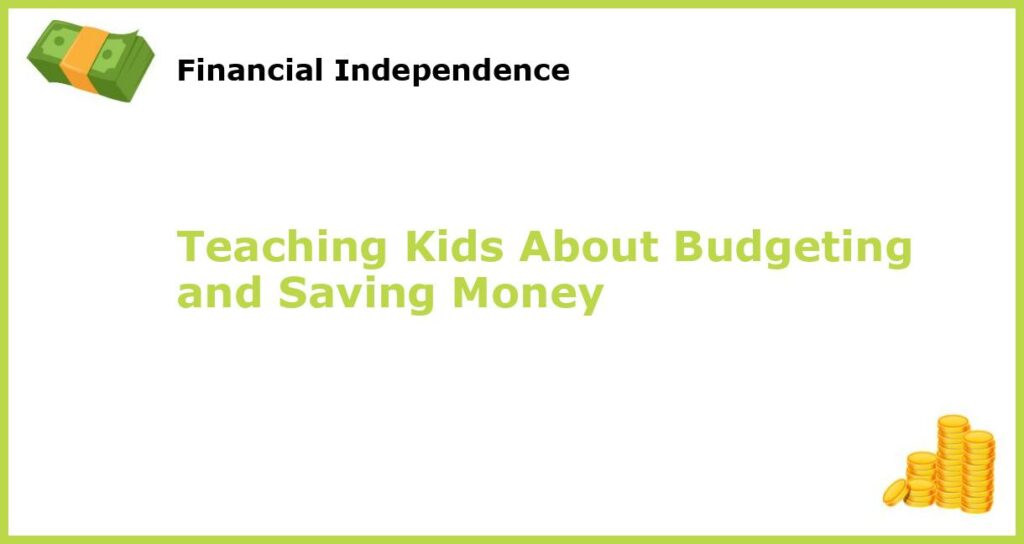Money is an essential aspect of our daily lives, and as parents or guardians, one of our major responsibilities to our children is imparting financial skills that will help them throughout their lives. Teaching kids about money from a young age can help them understand the concepts of responsibility, discipline, and goal-setting. Teaching them about the value of money, budgeting, and saving is not only important for their financial stability but also for their future success.
Start with Allowance and Chores

One of the best ways to teach kids about money is to give them an allowance and tasks to earn it. An allowance and chores are an excellent way to teach kids about the value of hard work and the concept of earning money. Assign simple tasks around the house, such as making their bed, cleaning their room, or helping with dinner. By participating in household chores, they will understand what it means to put in the effort and the rewards that come with completing tasks. It is beneficial when they are rewarded financially as it’s a tangible item they can hold on to and feel proud of themselves. Thus, teaching them that with hard work comes reward, and that financial gain is earned not given freely throughout their lives.
Goal-Setting and Budgeting Basics

Teaching children how to set financial goals and create a budget is a fundamental step in developing their financial skills. It is essential to involve children in monthly budgeting tasks, as that can help them understand the value of money and the costs of particular expenses. Depending on their age, it can start as something simple as writing a grocery list, how much it would cost, and tracking the expenses once the shopping is done. Simple goals, such as purchasing a video game, toy, or clothes, can be set weekly or monthly. Through goal-setting, they learn prioritization, decision-making, and the impact of expenses and savings. Without guiding them with these essential life skills, children may struggle with financial independence throughout their lives. This can be done with the help of a simple spreadsheet or a tool like Money Smart Kids.
Comparison Shopping and Wise Spending

As a parent, you can teach your kids shopping and spending techniques such as comparison shopping and seeking value for their money. Encourage them to compare prices and quality when making purchases or to consider second-hand stores for particular items. This can give them an excellent understanding that being savvy in spending leads to saving money in the long run. This will help them understand that more expensive does not always mean better and that spending wisely can stretch their money further. They can learn the importance of doing thorough research and mindfulness during shopping that can be critical towards their finances throughout their life.
Encourage Saving and Investment

Saving money and investing it can become a lifelong habit for children. Teach them the difference between saving and investing and how both can grow their money. A child might want to keep their piggy bank savings, but you can guide them to open a savings account, and with your help, an investment account to maximize their savings potential. Along with saving, it’s useful to discuss how dividends, compound interest, and the stock market can benefit their future finances. By teaching your children these concepts and giving them the basics of managing their finances, they will have a strong foundation on which they can build upon in their future experiences with money.
Role Modeling Good Financial Habits

The saying “actions speak louder than words,” holds true in most cases, and this is no exception when it comes to teaching kids good financial habits. Children learn by observing, and the best way to teach them about finances is to lead by example. Good financial habits, such as paying bills on time, avoiding debt, and investing for the future, will give them an excellent foundation for responsible financial management. It’s never too late to start forming good habits, and the more children see their parents modeling them, the more likely they are to follow their lead.
Teach Kids about Loans and Debt
In addition to saving, children need to understand the concept of loans and debt. Explain to them how borrowing money works, what debts can do to their financial future, and how to avoid unnecessary loans. Encourage them to operate within their means and only take loans for essential such as education, business, or emergencies, and teach them how to pay their debts on time or avoid them altogether. By making them understand early how loans can affect their finances, they can make informed decisions regarding their debt in the future.
Keeping Financial Records
Creating good financial records is an essential aspect of sound financial management. Teach your children how to maintain accurate records of their income, expenses, and savings, and show them how it can help them visualize their finances. This could be keeping track of their allowance, funds, spending, and saving in a simple ledger or spreadsheet. By keeping these records regularly and reviewing them, kids can understand the value of tracking their money and understand where each penny is spent.
Teaching Kids about Taxes
Taxes are essential for our economy and the administration of government affairs. Teaching your kids about taxes will help them understand how our society collectively contributes to the running of its institutions. They can learn that taxes are charged on income and goods, how tax rates differ, and how different tax laws affect their income. This way, they can understand the purpose of taxes and become more financially literate.
Make it Fun
Teaching children about money does not have to be boring. Make it fun with practical exercises such as setting up a lemonade stand, playing financial games like Monopoly or Bankaroo, or visiting the bank for an educational tour. There are also fun online resources such as financial literacy videos for kids, podcasts, and interactive worksheets that make learning about money entertaining and engaging. Children are more likely to retain lessons taught in activities that they enjoy, therefore mixing education and fun activities can help them understand and absorb financial concepts authentically better.







